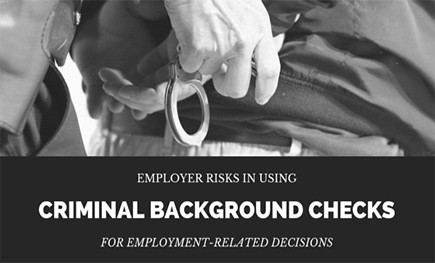Part I of this article can be found here.
The Fair Credit Reporting Act
Having considering the perils summarized above, an employer who still decides to use employee criminal background checks faces additional restrictions under other federal statutory provisions, namely the Fair Credit Reporting Act (“FCRA”). An employer who uses consumer reports to make employment decisions, including hiring, retention, promotion or reassignment, must comply with the FCRA. The Federal Trade Commission (“FTC”) enforces the FCRA.
The term “consumer report” means any written, oral, or other communication of any information by a consumer reporting agency bearing on a consumer’s credit worthiness, credit standing, credit score, credit capacity, character, general reputation, personal characteristics or mode of living.
Consumer reports are used or expected to be used or collected in whole or in part for the purpose of serving as a factor in establishing the consumer’s eligibility for employment purposes. That can include information from a variety of sources, including credit reports and criminal records. Thus a criminal background check is considered to be a “consumer report.”
An employer must take certain required steps in connection with obtaining and using a “consumer report” related to a job applicant, which can be summarized as follows:
Before obtaining a consumer report, an employer must:
- Provide written notice to the applicant, in a stand-alone document, that you might use the information in their consumer report for decisions relating to their employment;
- Obtain written permission from the applicant to obtain a consumer report;
- Certify that the company from which you obtain a consumer report is in compliance with the FCRA and EEO laws.
Before taking an adverse action, i.e., rejecting a job applicant based on information in the consumer report, you must provide the applicant with:
- Notice that includes a copy of the consumer report;
- A copy of the FTC’s A Summary of Your Rights Under the Fair Credit Reporting Act.
After an adverse action has been taken, based on information in the consumer report, an employer must:
- Give notice of the fact of the adverse action to the applicant, in writing or electronically (oral notice also allowed but is not recommended).
State and Local Government “Ban the Box” Laws
At the state and local levels, seventeen states, including Virginia and Maryland, the District of Columbia and more than 100 cities and counties, notably Fairfax County, Virginia, and Montgomery and Prince George’s Counties, in Maryland, have passed some form of legislation generically referred to as a “ban the box” statute.
“Ban the box” refers to laws that variously prohibit or restrict employers from requiring applicants for employment to divulge their criminal and conviction history through a check box on an application for employment. The theory behind “ban the box” statutes is that they promote hiring processes and practices that give applicants a fair chance and require employers to judge individual job candidates on their merits, instead of automatically disqualifying those who have a criminal history.
While Virginia, Maryland, and the District of Columbia all have laws on the books that restrict, among other things, employers from initiating criminal record checks until after a conditional offer of employment has been made, the reach of Virginia’s and Maryland’s laws extends only to public sector employees, as does Fairfax County’s law. Only the District of Columbia’s, Montgomery County’s and Prince George’s County’s ban the box statutes are applicable to private employers.
District of Columbia law mandates that an employer covered by the statute – those with 11 or more employees – cannot inquire about an applicant’s criminal history until after the employer has made a conditional offer of employment. While the law permits an employer to withdraw a conditional offer of employment based on a criminal records search of the employee, that can be done only for legitimate business reasons, taking into account essentially the same factors relied upon by the EEOC in its 2012 Guidance.
Montgomery County’s recently enacted ban the box statute covers private employers that have 15 or more full-time employees. Employers in the County are not permitted to conduct an investigation into an applicant’s criminal conviction record until after the completion of the initial job interview. An employer that decides to withdraw a conditional job offer must provide the applicant with a copy of the background check, identify the information relied upon for the decision to withdraw and afford the applicant seven days to review the information.
Prince George’s County’s ban the box statute took effect in December 2014. Similar to the law in neighboring Montgomery County, an employer may not ask about a job applicant’s arrest or conviction record until after the initial employment interview. Employment decisions based on an applicant’s criminal record are limited to consideration of criminal offenses that specifically demonstrate unfitness for the desired position, applying factors similar to those utilized by the EEOC.
Finally, like Montgomery County, if a Prince George’s County employer rescinds a job offer based on an applicant’s criminal history, the employer must provide written notice to the applicant of the recision, an explanation of the information on which the decision was based and a copy of the criminal background check that was used.

